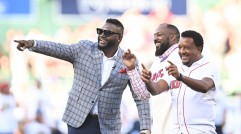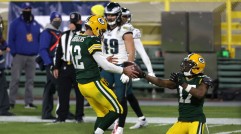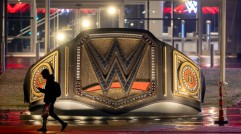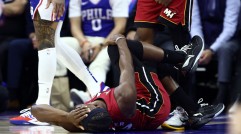Uruguay's Knocked-Out Pereira Admits 'Madness' of Playing on
(Reuters) - When Uruguay's Alvaro Pereira got up and staggered around after being knocked out cold in their World Cup game against England on Thursday, he insisted on playing on and his team let him.
The defender later admitted it was "a moment of madness".
Pereira was clattered in the face by England forward Raheem Sterling's knee an hour into the game and he lay unconscious as medical staff rubbed his chest and tried to revive him.
When he got up, staggering along the toughline, Pereira furiously pushed away medical staff who wanted him substituted and he forced his way back on to the pitch.
While his coaches let him play out the final 30 minutes of the game and he drew praise from other Uruguayan players, Pereira himself conceded it was the wrong thing to do.
"It was a moment of madness... I've apologized to the doctor because I know it's his job to look after the players," Pereira told reporters after Uruguay won 2-1 with a Luis Suarez double.
"I went back on dizzy. But in the heat of the moment with a hot head you don't think properly," he said.
"Still, it was a time to help the team and to get a result. And the most important thing is that we got the result."
The incident raised questions about whether Uruguay's bench took his head injury seriously enough.
Head injuries in sports have come under much closer scrutiny in recent years and campaigners quickly condemned the decision to let Pereira play on.
"That incident today is the kind of thing that happened a long time ago, its borderline barbaric," said Taylor Twellman, a former United States player who suffered five major concussions in his career and now campaigns for more controls in the sport.
"When a player is concussed he doesn't know what has happened - very dangerous to rely on what a player wants," Twellman told Reuters.
"Second impact syndrome is the most dangerous thing. If he goes down again he could die - that is science. You're playing with fire, you are playing with someone's life."
Uruguay goalkeeper Fernando Muslera said he was worried when he first went over to help Pereira.
"When I saw his eyes, I got scared and Diego (Godin) and I both began to call for the medics," he said. "He's an important player who loves the shirt and if he can keep playing he will. He is never going to abandon the pitch."
Subscribe to Latin Post!
Sign up for our free newsletter for the Latest coverage!
* This is a contributed article and this content does not necessarily represent the views of latinpost.com














